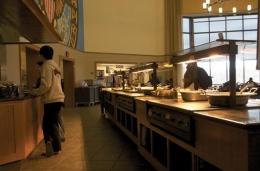
Dining workers filed a request asking Aramark to remain neutral on Feb.9. They have been working on the planning process for months.
The employees of Georgetown University Dining Services are looking to unionize.
On Feb. 9, about 80 percent of workers signed a request to their employer, Aramark Higher Education, asking the food service company to remain neutral if the workers wanted to form a union. A hands-off guarantee would make a union a near certainty after seven months of behind-the-scenes coalition building. If the request is successful, international service workers union UNITE HERE will represent all dining services workers in collective bargaining with Aramark.
Pending Aramark’s decision, the employees would engage in a card check process to approve a union. If a majority of the employees sign authorization cards in favor of unionization, the union would automatically be created and could then engage in collective bargaining.
“Ultimately, we leave the decision about union representation up to our employees,” said Karen Cutler, director of Aramark communications.
“Aramark is neither anti-union, nor pro-union. However, we would note that for half a century, Aramark has enjoyed excellent relationships with the 35-plus different unions that represent our employees,” Cutler said in an email.
A large coalition of students and faculty members helped propel the joint effort forward over the past seven months. According to David Schwartz (SFS ’12), one of the principal organizers of the group, a few hundred students and about 30 faculty members teamed up over time to work with UNITE HERE and the employees in a series of clandestine meetings.
Leaders of prominent campus groups like Georgetown University College Democrats, NAACP, Movimiento Estudiantil Chicano de Aztlán and EcoAction were asked to participate to ensure the student representation comprised a broad swath of the community.
According to Schwartz, students on campus over the summer began organizing with workers in July.
“Students have had relationships with campus workers for a long time. It was really these relationships that allowed us to do this together,” he said.
The impetus for unionization came from the employees’ desire to have a voice on the job, Schwartz said.
“It really isn’t ‘Why are these workers’ conditions so bad?’ or ‘Why is it so necessary to have a union?’ The basic idea here is that Catholic social teaching says that workers should have the right to collectively bargain,” Schwartz said. “There’s no reasoning why I shouldn’t and other students shouldn’t stand up in solidarity with these workers.”
At Georgetown, dining workers’ minimum wage comes out to $11.34 an hour, which can make it difficult for employees to cover health care costs, Schwartz said.
“[Health care is] fairly unaffordable for workers who are making that kind of wage, especially for workers with families, who aren’t just looking for health care for themselves,” he said.
According to Schwartz, the employees’ push to coalesce has been a long time coming. Some of the workers have been at Georgetown for as long as 30 years without union membership.
“These workers were ready, and they’ve wanted this for an extremely long time. It was a matter of speaking to their friends, colleagues and co-workers and talking to them about what they’d like to change,” Schwartz said.
Throughout the process, the university has also stood behind the workers’ effort and helped advocate on behalf of them to the national employer.
In a letter sent to Aramark on Feb. 3, Associate Vice President of Auxiliary Services and Assistant Vice President of Business Policy Planning LaMarr Billups affirmed Georgetown’s commitment to its workers.
“As a trusted and valuable business partner, we want to be proactive in communicating Georgetown University’s expectations regarding that organizing effort,” they wrote in the letter. “The Just Employment Policy, which is a condition of the contract between [Aramark and Georgetown], explicitly requires vendors to respect and protect employee rights to freedom of association.”
According to Cutler, the corporation is currently in compliance with the Just Employment Policy.
Last year, the company decided to remain neutral when Aramark workers at Loyola University of Chicago decided to unionize. Dining hall workers successfully organized there after an extensive effort by students, professors, Jesuits and workers.
Aramark has been criticized by national labor unions including UNITE HERE for discouraging their employees from organizing and allowing poor working conditions, wages and benefits. In 2008, UNITE HERE and Service Employees International Union, two of the largest service-worker unions led a protest in New York City to condemn Aramark’s practices.
According to their website, Aramark feels they are better equipped than unions to meet workers’ needs.
“Our preference is that our employees deal directly with Aramark on issues concerning their employment, rather than through third-party unions,” the website states.
According to the website, about 30 percent of Aramark employees are unionized.
Dining hall workers at Aramark-operated college dining halls nationwide have successfully joined together for collective representation.
Workers at Johns Hopkins University, University of Pennsylvania and Loyola Chicago have formed unions.
“In fact, we have more than 700 collective bargaining agreements across North America and seldom, if ever, have a serious dispute with any of our unions,” said Cutler, of Aramark’s communications director.
Georgetown contracted Aramark in July 2007 to manage its dining services in conjunction with an expansion of dining services and renovation of Leo O’Donovan Hall, the main dining hall on campus. At the time, university spokeswoman Julie Bataille told THE HOYA that all employees would be offered similar jobs under Aramark.
Leaders of the employee movement to unionize could not be reached for comment.
— Hoya Staff Writers Eamon O’Connor and Laura Engshuber contributed to this report.
A version of this story was originally published on THE HOYA’s website on Feb. 17.














